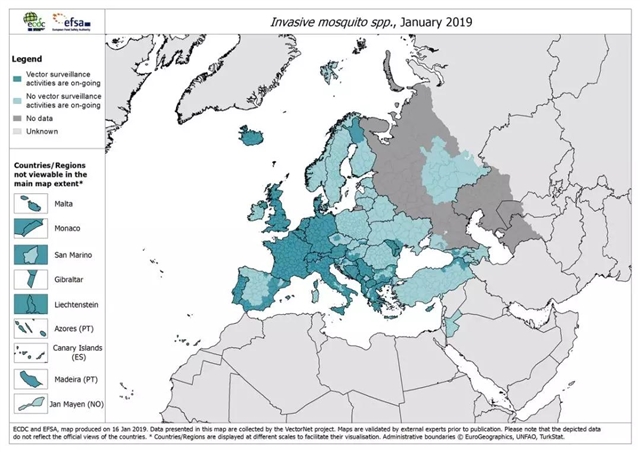|
|
|
|
|
气候变化对媒传疾病的影响及应对策略 | Infectious Diseases of Poverty |
|
|
论文标题:Impact of past and on-going changes on climate and weather on vector-borne diseases transmission: a look at the evidence
期刊:Infectious Diseases of Poverty
作者:Florence Fouque and John C. Reeder
发表时间:2019/06/13
数字识别码:10.1186/s40249-019-0565-1
原文链接:http://t.cn/AiOwUqpv
微信链接:https://mp.weixin.qq.com/s/Sb9dw8N7TrEn8kd7zz-AeA
疟疾、黄热病、莱姆病、鼠疫、登革热和利什曼病等媒传疾病(Vector-Borne Diseases, VBDs)每年会导致全球70万人死亡。目前,VBDs主要分布在热带和温暖气候条件下,全年传播,而地球变暖会改变这一现状。
Florence Fouque和她的同事研究了气候变化对媒传疾病的影响,并将研究成果发表在了Infectious Diseases of Poverty 上,题目为Impact of past and on-going changes on climate and weather on vector-borne diseases transmission: a look at the evidence。在下文中,Fouque分享了一些关于如何应对气候变化对媒传疾病影响的思考。

埃及伊蚊
图片来源:Florence Fourque
媒传疾病(VBDs)约占所有传染病的17%。昆虫和蜱类是VBDs的主要载体,它们不能调节自己的体温,其生物学和地理分布都与非常特殊的气候条件有关。因此,天气和气候条件的变化将直接强烈地影响VBDs病原体的载体和其传播模式。
已经有许多证据表明,气温和降雨变化以及极端气候事件可对许多疾病产生影响,Infectious Diseases of Poverty 也发表过不少相关论文。为减缓气候变化,一些国家和国际组织制定了相关干预措施和政策,大多数国家已经采取了具体行动来应对气候变化对公共卫生的影响。
在许多情况下,可实施适当的政策和干预措施,来预防和控制气候变化造成的疾病流行,避免其对受感染人群的健康造成致命后果,各国也可开发相应的监测和预防工具。此外,全球和国家研究项目可加大支持力度,以进一步了解VBDs传播机制,以及气候变化VBDs的影响。
有效预防VBDs必须要有一个适当的监测系统。这个系统不仅要能报告和分析病情案例以及相关人群的健康/免疫状态,还需要能按照标准指标(如世界卫生组织登革热监测系统,WHO Dengue surveillance system)定期调查向量的丰度与分布。
与此同时,这样的监测系统需要专业人员收集、识别和报告在不同阶段的感兴趣 的病媒个体。此外,由于病媒很容易跨越各国及地区之间的地理边界,监测系统必须通过国家间的信息交流和定期会议来完成跨国界的合作,从而共同协调干预行动。例如,在欧洲,埃及伊蚊从上世纪70年代末进入南欧,目前已到达法国和德国的北部界限,欧洲疾病控制中心(ECDC)随即展开了欧洲国家之间的合作。

蚊子入侵地图,2019年1月
图片来源:ECDC
良好的全球及国家级公共卫生防备系统可减少气候变化对VBDs传播的影响,防止气候变化引发疫情。恰当的准备工作可以增强公共卫生系统对这些动态事件的应变能力。然而,如果公共卫生系统缺乏必要的储备,气候变化可能加重VBDs传播,或造成其他不良后果。例如忽视了带菌者进入人类对潜在疾病没有免疫力的新地区会构成的威胁。在公共卫生系统的准备工作中应包括一项完善的计划,以应对从无病媒、无病例,到已确定病媒群体、病例数上升,再到疫情出现、疫情结束等不同情况。
该计划必须结合每一种潜在情况的多部门响应,包括1)决策链和协调机制;2)流行病学监测与诊断途径的战略,包括医院设施在内的病例管理;3)病媒监测和控制战略以及4)交流活动。在具体实施计划部署时,还需要一个监测和评价体系来进行总结经验教训,在动态环境中不断改进。参与不同活动的相关人员的接受和/或积极参与也至关重要,也应将其纳入该计划的支持政策中。
通过政策激励和规划,可加强VBDs传播系统以及它们如何受气候变化影响的知识和能力建设进一步改进预防准备工作。
TDR/IDRC的一个研究项目为以上措施的开展提供了范例。该项目研究了气候变化对非洲旱地VBDs影响,注重政策制定者、研究人员和社区之间的对话。它为国家制定规划推荐了新工具,从而能够帮助这些人口建立适应能力,并为气候变化做好更好的准备。

非洲南部干旱地区的TDR项目
图片来源:http://vbd-environment.org/
最后,我们不应该忘记我们生活在一个不断变化的环境中。很多变化源于由物理、自然和环境因素,而有些变化则受人类活动影响而加速和/或改变。但在所有情况下,通过现有的、以及新的战略和干预措施,公共卫生系统和/或社区都需要对变化具备恢复力和适应性。
摘要:
Background
The climate variables that directly influence vector-borne diseases’ ecosystems are mainly temperature and rainfall. This is not only because the vectors bionomics are strongly dependent upon these variables, but also because most of the elements of the systems are impacted, such as the host behavior and development and the pathogen amplification. The impact of the climate changes on the transmission patterns of these diseases is not easily understood, since many confounding factors are acting together. Consequently, knowledge of these impacts is often based on hypothesis derived from mathematical models. Nevertheless, some direct evidences can be found for several vector-borne diseases.
Main body
Evidences of the impact of climate change are available for malaria, arbovirus diseases such as dengue, and many other parasitic and viral diseases such as Rift Valley Fever, Japanese encephalitis, human African trypanosomiasis and leishmaniasis. The effect of temperature and rainfall change as well as extreme events, were found to be the main cause for outbreaks and are alarming the global community. Among the main driving factors, climate strongly influences the geographical distribution of insect vectors, which is rapidly changing due to climate change. Further, in both models and direct evidences, climate change is seen to be affecting vector-borne diseases more strikingly in fringe of different climatic areas often in the border of transmission zones, which were once free of these diseases with human populations less immune and more receptive. The impact of climate change is also more devastating because of the unpreparedness of Public Health systems to provide adequate response to the events, even when climatic warning is available. Although evidences are strong at the regional and local levels, the studies on impact of climate change on vector-borne diseases and health are producing contradictory results at the global level.
Conclusions
In this paper we discuss the current state of the results and draw on evidences from malaria, dengue and other vector-borne diseases to illustrate the state of current thinking and outline the need for further research to inform our predictions and response.
阅读论文全文请访问:
http://t.cn/AiOwUqpv
期刊介绍:
Infectious Diseases of Poverty(https://idpjournal.biomedcentral.com/, 2.708 - 2-year Impact Factor, 3.126 - 5-year Impact Factor) is an open access, peer-reviewed journal publishing topic areas and methods that address essential public health questions relating to infectious diseases of poverty. These include various aspects of the biology of pathogens and vectors, diagnosis and detection, treatment and case management, epidemiology and modeling, zoonotic hosts and animal reservoirs, control strategies and implementation, new technologies and application. Transdisciplinary or multisectoral effects on health systems, ecohealth, environmental management, and innovative technology are also considered.
(来源:科学网)
特别声明:本文转载仅仅是出于传播信息的需要,并不意味着代表本网站观点或证实其内容的真实性;如其他媒体、网站或个人从本网站转载使用,须保留本网站注明的“来源”,并自负版权等法律责任;作者如果不希望被转载或者联系转载稿费等事宜,请与我们接洽。